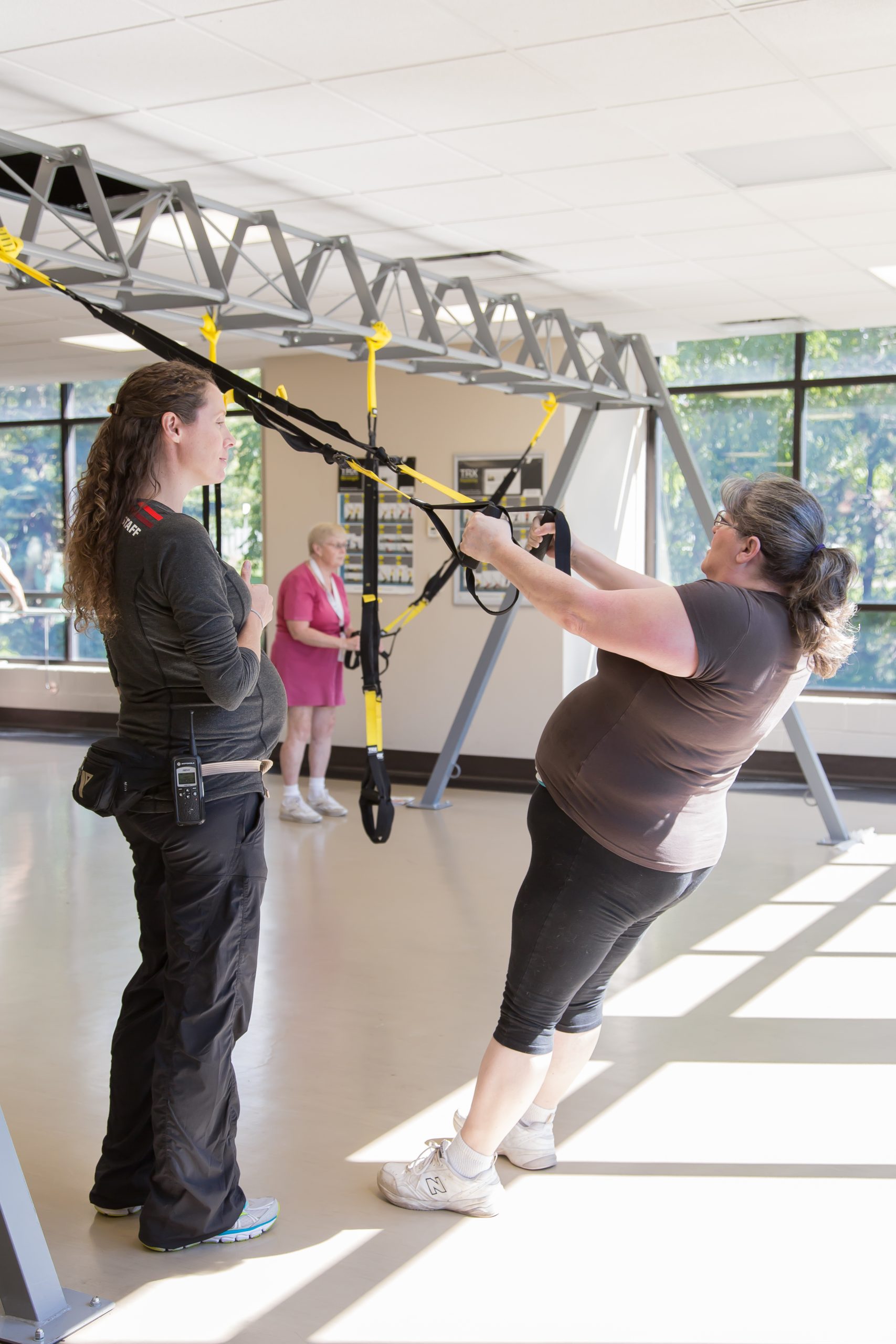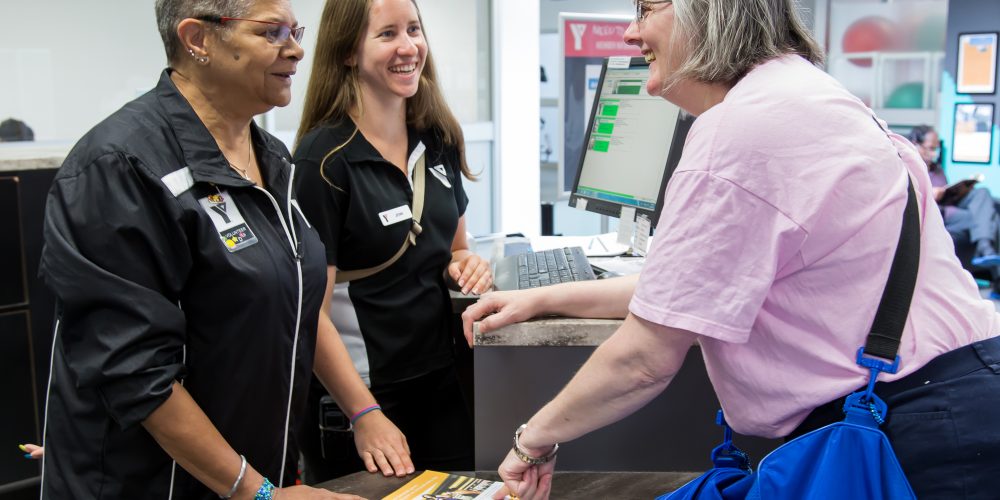Visiting the AR Kaufman Family YMCA in Kitchener, Ontario, is a bit like dropping into an idealized version of the old family homestead. The young and old, quiet and noisy, confident and shy all gather there – many generations under one roof, working together to build for the future.
Add the motto of the YMCA of Cambridge/Kitchener/Waterloo (YMCA-CKW) and the image is complete “Dream, Grow and Achieve Together.”
Visiting the AR Kaufman Family YMCA in Kitchener, Ontario, is a bit like dropping into an idealized version of the old family homestead. The young and old, quiet and noisy, confident and shy all gather there – many generations under one roof, working together to build for the future.
Add the motto of the YMCA of Cambridge/Kitchener/Waterloo (YMCA-CKW) and the image is complete “Dream, Grow and Achieve Together.”
The motto is also a very good synopsis of the benefits of belonging. That doesn’t come by accident for this organization or for the people who bring that motto to life every day in Waterloo Region.
“Here, it’s just not about you,” explains John Haddock, recently retired CEO of YMCA-CKW. “You’re part of a meaningful whole. Be it through the promotion of a healthier lifestyle via our health and fitness programs or via our social programs for children, seniors, newcomers and families to help them feel more connected, we need each other to get things done. Our job, as stakeholders and caretakers of the YMCA legacy, is to find ways to float all boats (of need in our community) and to figure out ways how others can win.”
“Winning” is an interesting (read “non-traditional”) goal for a social service provider, but with Haddock encouraging his team to always do what’s best for the community, the YMCA-CKW has grown five times larger over the past 15 years. It is a wonderful testament to the leadership of the soon-to-be-retiring Haddock and the dedicated work of staff and volunteers who have delivered these remarkable results at a time of decreasing resources.
The YMCA-CKW responds to our community’s needs – and we have been doing so since our founding.”
– John Haddock, recently retired CEO of YMCA-CKW
The YMCA-CKW’s wide range of services is particularly important for those seeking to find their place in a new community, a new country or even just upon entering a new life stage. One of the greatest threats to mental and physical well-being is loneliness and social isolation. Research has shown that lacking social connections is as damaging to our health as smoking 15 cigarettes a day. And we also know that lonely individuals are more prone to depression. So a community that ascribes to the philosophy that “we’re only as strong as our weakest link” understands the importance of providing friendly and welcoming support infrastructures.
The YMCA builds those bridges.
Haddock reminds us that the YMCA-CKW was initially empowered by benefactors representing the titans of industry in 1920’s Waterloo Region. The Kaufmans, the Dares and the Breithaupts – each family a driver of the Region’s historic legacy as a manufacturing hub – “felt a responsibility for the broader community,” says Haddock. That ethos lives on today even as the Region’s burgeoning tech sector (and the new titans-of-industry) takes over the civic leadership previously held by their manufacturing-centric corporate ancestors.
“Whether it’s providing ESL classes for new Canadians or providing settlement services and confidence-building programs to refugees, the YMCA-CKW responds to our community’s needs – and we’ve been doing so since our founding,” says Haddock. “So when, today for example, we as a community need to support a new wave of Syrian refugees, we can count on our experience in helping Vietnamese boat people in the ’70s and ’80s, or our work in helping to settle thousands of displaced people after World War II.”
The YMCA-CKW, and the broader YMCA movement, has been instrumental in building both a personal and community-wide sense of belonging for more than a century. And the tools they use extend far beyond the equipment in today’s centres. In fact, that noble purpose of building communities was embedded in the organization’s founding beliefs and infuses each team member’s actions today. And it continues to play the central role in strategizing the organization’s most-appropriate roles for the future.
“… And just go there, to the Y-M-C-A.
I’m sure they can help you today.”
– Lyrics from YMCA, The Village People
Ubiquity can be both a blessing and a curse. When something has been around for seemingly forever and is in just about every small town and major metropolis, we can take it for granted and/or come with preconceived notions of its value. The YMCA is much like that. We’ve all got ideas as to what services the YMCA provides – and many of those ideas are informed by the historical interactions we may have had with the institution.
For some of our oldest Canadians, the YMCA may have been the only address they had when moving to a new community. Branches sprouted up as our country developed, in many cases hand-in-hand with the development work of building railways or pioneering new regions.
Sports fans may know of the founding role of the YMCA in creating the sports of basketball and volleyball. Or we might remember our youthful swimming lessons and sports teams fostered by YMCAs across this country.
For others, the connection is more tangential, from walking past the YMCA buildings in our communities to dancing like a fool at some family wedding when that famous song plays. We’re aware of the YMCA but, chances are, we don’t have a full appreciation of its historic role in building a sense of belonging – and its current work (and future plans) for helping more Canadians dream, grow and achieve.
This here is my family.”
– Denise Philip from the YMCA of CKW
The YMCA story began in London, England, over 170 years ago with one man who had an idea about how to make his community stronger. George Williams, a 22-year-old draper, started the YMCA in 1844 in response to unhealthy social conditions brought on by the Industrial Revolution.
The idea quickly caught on, and soon associations were springing up in cities throughout England and Europe. By 1851, the idea travelled across the seas. When the first YMCA in North America opened in Montreal on Nov. 25, 1851, a grassroots effort to help people and communities to grow and thrive was set in motion.
The YMCA helped grow the Canadian Pacific Railway in the late 1800s. YMCAs were built along developing railway lines, providing recreation, literacy programs, reading rooms and accommodation to workers who were otherwise limited to visiting saloons during their leisure hours. Several of today’s Ys can trace their roots to a railway YMCA.
As Canada’s population increased at the turn of the 20th century, the Y’s role expanded. In 1906, Toronto YMCA staff member George Corsan introduced a radically different kind of swimming instruction. It was taught to groups rather than individuals and before going into the water, students learned basic movements through a series of land drills. These new swimming classes quickly became popular. In 1910, Canadian William Ball launched a national YMCA swimming instruction program.
Supporting families has always been a key role for the Y, especially in Canada. Beginning in the first half of the 1900s, many YMCAs and YWCAs operated day nurseries to serve working families, although no licensing agencies existed at that time. As more women joined the workforce in the 1960s, many YMCAs began offering licensed child-care programs.
And the YMCA continues to support families. The YMCA Playing to Learn curriculum helps children up to age six discover learning through creative play that works with a child’s natural curiosity and development. In 2006, the curriculum was rolled out to licensed YMCA Child Care Centres across Canada.
And in 2016, the YMCA of Greater Toronto launched its curriculum for before- and after-school programs, YMCA A Place to Connect. This makes the YMCA the first organization in Canada to have a curriculum for school-age programs.
As a charity, the YMCA provides vital community services that have a positive impact on some of Canada’s most pressing social issues — from chronic disease to unemployment, social isolation, poverty, inequality and more.
Central to the Y success are:
- The people who unite behind their mission and bring their many talents to work;
- The safe and welcoming places the YMCAs provide — from health facilities to classrooms to newcomer centres;
- The comprehensive community-based programs that provide extra skills and opportunities.
These three critical resources — people, places and programs — come together to create a sense of belonging to a supportive network that helps members and program participants achieve personal development goals, be they physical, mental, social and/or emotional.
For those of us living in Waterloo Region, there is no better way to gain an appreciation of the YMCA-CKW’s role in building a sense of belonging than by visiting one of its many locations, speaking to staff and volunteers, and soaking up the laughter and smiles that seem to emanate from every corner of the building.

A fitness coach watches her client at the YMCA gym. Photo by Tomasz Adamski.
I noticed Denise Philip (affectionately known at the Y as Momma D) when I stopped by the AR Kaufman Family YMCA on a hot summer day in July. She was at the front desk, answering questions, giving and receiving hugs, and generally acting as a combination bouncer and greeter. She’s fiercely proud of her YMCA family and does her best to keep watch over her charges, be they guests or team members.
As someone who had used the YMCA-CKW’s services in the past, she has an intrinsic appreciation of its importance to building a stronger Waterloo Region. So the Kaufman Y was an ideal place to volunteer when she became an empty-nester. Now she spends her days helping others, connecting visitors with the wide array of programs and services on offer. And with services running from 8 a.m. and to 11 p.m., there are a lot of visitors to manage and a lot of programs/services to deliver.
For example, the Kaufman Family YMCA delivers innovative health care programs effective in combating diseases like diabetes and cardiac complications, the effects of aging like osteoporosis and arthritis, and in helping patients rehab from surgery or debilitating injuries or illnesses like strokes. Not only are the fitness instructors on hand to help devise and deliver these programs from a physical health perspective, but there are also ample community-based and other social supports to ensure that peace-of-mind comes along with health-of-body.
And with the peer-to-peer work of encouraging compliance with “doctor’s orders” or to simply keep up with the program, it is not unusual for participants to migrate from the gym to the common area, continuing the conversations that may have started hours previously with the first pushup. In fact, as I waited to speak to a particular guest, a woman in her 80s keeping fit in the gym, there was a delay due to her deep conversation with Philip at the front desk. When she was finally able to speak with me, she apologized with a “We got visiting.” Then she proceeded to tell me that, at the YMCA-CKW, “this is where I belong.”
From the looks – and sounds – of it, the YMCA-CKW is a place where citizens belong during all stages of their life journey. On the day of my visit, there were young day-campers excitedly getting ready for an afternoon’s trip to the Waterloo Region Museum. These children, from diverse backgrounds and experiences, shared the common language of curiosity and were eager to explore and learn. There was a Caregiver Support group meeting in session, a critically important service that supports individuals who give care to those most in need. The pool was packed, the racket courts busy, the gym a place of sweating bodies and clanging metal.
The YMCA movement will continue to help Canadians achieve their potential.”
And as we look to the future, we can see an important role for YMCAs in building stronger and more vibrant communities. With an unparalleled 170-year history of helping people feel like they belong combined with leading-edge and in-demand solutions in such important areas as childcare and seniors’ health care, the YMCA movement will continue to help Canadians achieve their potential.
Best of all? While the YMCA may be ubiquitous, the team at YMCA-CKW isn’t self-satisfied. Despite all of the incredible work being done today, they understand that they’ll need to explore new partnerships and new programs to address new problems and goals, be they local or international.
As I’m readying to depart the AR Kaufman Family YMCA after an inspiring visit, I shared my thoughts (and kudos) with director of philanthropy Beth King.
“While we’ve got a long way to go,” King says, “I’m confident that, together with our community and with the help of our programs and services, we’ll get to a point, not too far in the future, where every resident feels like they truly belong in Waterloo Region.”
A worthwhile mission, and from the smiling faces that I saw and the laughter that I heard, I’m pretty sure that Canada’s YMCA – and the YMCA-CKW in particular – will continue to be a centre of growing communities for the next 170 years and more.












